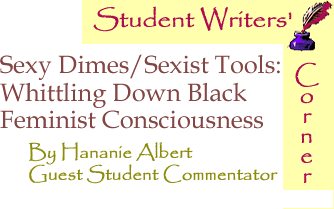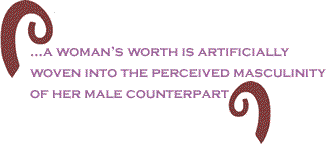
|
|||||||||||||||||||||
|
||||||||||
|
||||||||||
|
The current issue is always free to everyone If
you need the access available to a |
||||||||||
 |
||||||||||
 |
||||||||||
|
The shared historical consciousness of Blacks ensures that issues of injustice and inequality, such as affirmative action, discrimination and systemic racism, will hold captive audiences. However, the mere mention of feminism, the foe to one of the worst assaults to justice � sexism, is met by outright apathy by most and mild interest by a few. Black feminism aims to negotiate a space whereby both sexes can explore the entanglements of race, sexuality, class and gender. In doing so, black feminist structures combat the sexist implications embedded in societal constructions of gender. Despite its homology to racism and other forms of injustice, sexism is viewed as a factor of minimal importance in black consciousness. Feminist theorist, Pauline Terrelonge, offers several reasons for the exclusion of feminist ideals from vernacular concepts of consciousness including:
These explanations are fundamentally valid, however, they suggest that Black women live in denial of the sway of sexism and in ignorance of the power of patriarchy. I suggest that Black women are acutely aware of these structures and adopt the sexist and patriarchal paradigms as coping mechanisms. We dismiss the possibility that black males, who have historically been subjects of white patriarchy, will fully divest themselves of their newfound patriarchal entitlement. As such, we ally ourselves with black patriarchal privilege by accepting sexist institutions, attempting to establish binaries between other women and ourselves and rejecting alternative paradigms of masculinity. We gladly clothe ourselves in sexism and accessorize our lives with its accoutrements, Invectives such as �bitch� and �ho� become monikers � even compliments if they are preceded by suitable adjectives. The best compliments are, of course, terms that appraise us (dime piece) or relate us back to our �natural� functions (sex-y). We accept bawdy and misogynistic depictions of women in the media � we even deem the word �ho� an accurate title for these women � after all, we are not accepting the title for ourselves and these women fit our culturally constructed notions of what constitutes a �ho� . We fail to see that �ho� is more than a term or a title; it is a sweeping assertion of dominance. It is a vantage point that belongs only to the bearer of patriarchy. It is reaffirmation of black male entitlement as the sole vendor of the black woman�s body. Calling a woman a �ho� is an immediate reference to her expendability and the ease with which she, and thus all women, can be commodified. Moreover, we fail to recognize that agreeing with the use of the term �ho� does not place us in a position of superiority over the woman or a position of symbolic parity with the man. Nonetheless, we have accepted the patriarchy of the day � a woman�s worth is artificially woven into the perceived masculinity of her male counterpart. The lack of feminist masculinity, a masculinity that replaces doctrines of patriarchal domination with those of mutuality and sexual equality, is largely related to our inability to accept alternative paradigms of masculinity. Our rigidly dichotomous distinctions of gender do not allow for aberrations � if a male partner wanders from his assigned role, he is less of a man � and his female companion is exigently less of a woman. As much as I espouse black feminist ideals, there is a gaping dissonance between these ideals and the thoughts behind my actions with my significant other. When I am out to dinner, I insist on paying the tab, but I secretly cringe when he allows me to do so. I discreetly slip him my credit card so the waitress believes that he is paying. (After all, what am I worth if a man cannot buy my dinner?)
When we discuss his family or equally sensitive topics, I will hold him close if he begins to cry, but I silently deem him unmanly if he continues for more than five minutes. I consider myself a sexually empowered and liberated woman, but sulk if I have to initiate intimacy. (Shouldn�t I be pursued? Shouldn�t I be a conquest? Shouldn�t I be desired?) Will my ideals ever subsume my counter feminist thoughts? Can black feminist consciousness merge with vernacular discourse or will it be whittled away by the steel chisel of female sexism, resignation and apathy? Black feminist consciousness, like historical and national consciousness is rooted in the belief of an inalienable right to justice. However, unlike the other forms of consciousness, Black feminist consciousness requires more than a rudimentary understanding of justness and equality � it requires confronting existing patriarchal paradigms, identifying the extent to which they have been internalized and firmly resolving to combat them on all fronts � internal and external. A holistic approach such as this ensures that the new foundation for black gender politics is equipped to meet the call of present and future challenges. I do not believe that I can ever fully divest myself of the sexist frameworks into which I was socialized. However, with firm resolve and a fighting will, I am well equipped for the daily battle for the liberation I know Black feminist consciousness provides. Perhaps I can convince my Black sisters of the same. Hananie Albert is a third year student at the University of Florida. She is currently triple majoring in Anthropology, English and French with a minor in African American studies. Additionally, Ms Albert is a University Scholar, a McNair Scholar and the editor of BlackListed Magazine, a publication that aims to bring social awareness to the University of Florida population. Her primary interest is the African Diaspora, its social history, intellectual legacies and cultural productions. Her other interests include postcolonial literature, postcolonial film theory, gender, ethnic studies, black intellectual thought, womanism, black feminism, literature, Haitian women's history and subversive women's movements. To contact Ms. Albert, please click here. |
||||||||||
| October
11,
2007 Issue 248 |
|
| Printer Friendly Version in resizeable plain text format format |
 |
 |
 |
| |
| |


































